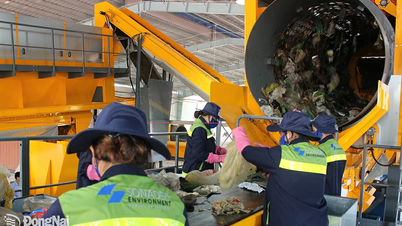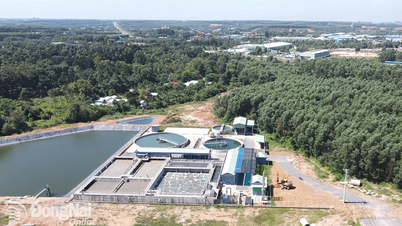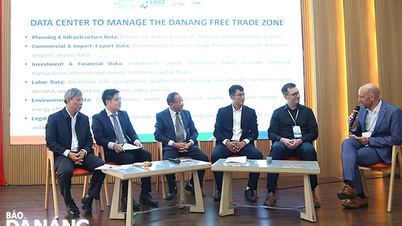Building a modern and transparent business environment
According to Dr. Tran Dinh Thien, former Director of the Vietnam Economic Institute, to create a real turning point for the private economic sector, the most important thing is to reform the institutions comprehensively, thoroughly and synchronously, starting from the highest level of the management apparatus. Dr. Tran Dinh Thien said that in the past, reforms were mainly in the direction of "asking - giving", from the bottom up, so they were often not thorough, and even contained many risks. Without changing the approach, it will be difficult to liberate the resources and creativity of the private sector, which is considered the most important driving force of economic growth.
Dr. Tran Dinh Thien said that institutional reform must go hand in hand with changing management thinking, shifting from “restricting - asking for” to “empowering - accompanying” businesses. That is the foundation for building a modern, transparent business environment, focusing on efficiency instead of administrative formalities.
Another core issue pointed out by Dr. Tran Dinh Thien is the gap between policy and action. Many policies to support the private sector have been issued, but when implemented at the local level, they are entangled in many overlapping regulations, and enforcement officers are afraid of responsibility, leading to businesses still being "lost" in the legal corridor. Therefore, in addition to legal reform, there needs to be an administrative apparatus with sufficient capacity, courage, and especially a spirit of service instead of control.
According to Dr. Tran Dinh Thien, we cannot continue to expect growth based on cheap labor or resource exploitation. The strength of the national economy now lies in creativity, technology and the speed of adapting to new trends. Therefore, the private sector, with its advantages of flexibility and dynamism, must become a pioneer in the process of transitioning to a knowledge-based economy, digital economy and green economy. Dr. Tran Dinh Thien believes that the spirit of entrepreneurship needs to be raised to a new level, not just individual entrepreneurship but systemic entrepreneurship. Therefore, the state needs to encourage the formation of innovation centers, private high-tech zones, and privately owned investment funds. At the same time, there should also be specific preferential policies on taxes, credits, and land for enterprises that innovate technology, apply artificial intelligence, blockchain, green technology, etc.
Analyzing the role of the new generation of entrepreneurs, Dr. Tran Dinh Thien said that the new generation of entrepreneurs must not only be good at business but also have a global mindset, a sense of the rule of law and a spirit of sustainable development. This will be the force leading the private sector to integrate more deeply into the global value chain, gradually upgrading the position of Vietnamese enterprises in the international market.
However, for private enterprises to develop sustainably, it is also necessary to build a synchronous “support ecosystem”, including a flexible banking system, strategic consulting organizations, high-quality human resource training centers, and a consistent and stable legal system. If these factors are lacking, enterprises will easily fall into a state of “swimming alone”, not strong enough to overcome market shocks.
Dr. Tran Dinh Thien assessed the role of regional and sectoral linkages in developing the private economy. According to Dr. Tran Dinh Thien, it is necessary to shift from a localized development model to an inter-regional connectivity model according to the value chain. Provinces and cities need to proactively coordinate to selectively attract investment, promote comparative advantages instead of unfair competition. The State can play a coordinating role, providing a regional linkage policy framework for private enterprises to participate more effectively. In the long term, Dr. Tran Dinh Thien believes that it is necessary to establish a separate legal framework for private enterprises, including a policy feedback mechanism from the business community, indicators to assess the friendliness of the business environment and an official dialogue channel between enterprises and the government. This will not only help improve the quality of policy making, but also create confidence and motivation for the private sector to confidently invest in development.
Deep and synchronous institutional reform
From the perspective of agricultural production enterprises, Ms. Tran Thi Thu Thuy, Director of OCOP Center Company, said that Resolution No. 68 on private economic development is not only a political orientation, but also a very realistic expectation of the private business community. The Politburo's clear affirmation that the private economy is one of the most important driving forces of the economy has created a new mindset for businesses. Resolution 68 has added confidence for businesses to boldly set long-term development goals, proactively expand markets and pursue new directions with the spirit of daring to think and daring to do. For the Resolution to truly come into life, what businesses expect is its transformation into specific, easy-to-understand, easy-to-access and highly feasible policies.
Ms. Tran Thi Thu Thuy said that the biggest barriers that agricultural enterprises are facing include: lack of market information, lack of international trade connection mechanism, substandard packaging and especially high logistics and product preservation costs. Many export markets are considered to have great potential, but enterprises lack the necessary data to position their products, and are unclear about how to approach or connect with suitable partners. In that context, most enterprises still have to manage the entire process, from production to trade, despite limited capacity and resources.
According to Ms. Tran Thi Thu Thuy, to overcome the above barriers, it is essential to have a truly constructive institution, in which the state plays a supporting role for private enterprises through functional platforms such as market information, standards, technology, logistics and trade promotion. In the agricultural sector, it is necessary to promote the application of preservation technology and apply modern processing procedures to meet the requirements of long-distance transportation and ensure quality standards according to international regulations.
From the practical operation of enterprises, Ms. Tran Thi Thu Thuy expects that the new regulations will eliminate the "ask - give" mindset, instead, there will be clear and transparent policies, ensuring the initiative for enterprises to promote their own capacity, as the spirit of Resolution 68 has pointed out: if the private economy wants to make a breakthrough, it must start with extensive and synchronous institutional reform.
According to VNA
Source: https://baodanang.vn/kinhte/202505/cai-cach-the-che-kien-tao-dong-luc-cho-kinh-te-tu-nhan-phat-trien-4006549/







![[Photo] Prime Minister Pham Minh Chinh and Prime Minister of the Kingdom of Thailand Paetongtarn Shinawatra attend the Vietnam-Thailand Business Forum 2025](https://vphoto.vietnam.vn/thumb/1200x675/vietnam/resource/IMAGE/2025/5/16/1cdfce54d25c48a68ae6fb9204f2171a)



















![[Photo] President Luong Cuong receives Prime Minister of the Kingdom of Thailand Paetongtarn Shinawatra](https://vphoto.vietnam.vn/thumb/1200x675/vietnam/resource/IMAGE/2025/5/16/52c73b27198a4e12bd6a903d1c218846)





























































Comment (0)